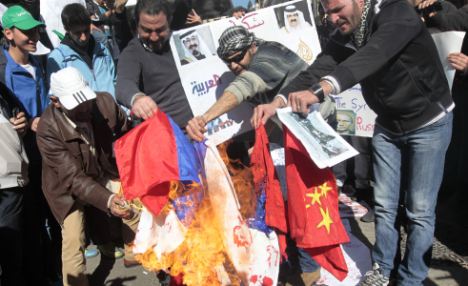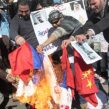
Possible Sub-Texts to the Sino-Russian Veto of the Security Council Resolution on Syria (Part One)
Publication: Eurasia Daily Monitor Volume: 9 Issue: 42
By:

A Sino-Russian Alliance to What End?
The emergence of a close alliance between the Russian Federation and the People’s Republic of China would mean a fundamental shift in the strategic balance of power, not seen since the collapse of the Soviet Union or the American opening to China. It would, if based upon a solid understanding of shared interests, set the stage for a serious challenge to US global leadership and give a character to Eurasia’s role in global affairs. Sino-Russian cooperation on regional issues is not new. The Shanghai Cooperation Organization has played a major role in Central Asia for the last decade. But this was a regional arrangement. It might express concern about US and NATO presence in that region but its focus was the threat posed by Islamic terrorism. The recent Sino-Russian cooperation over Syria in the UN Security Council, General Assembly and other international forums speaks to larger concerns, a shared sense of risks, and a willingness to coordinate policy to oppose the United States, NATO, and other regional powers where their actions threatened Chinese and Russian interests.
In the course of the recent Security Council debate leading up to the veto of resolution S/2012/77, which condemned wide-scale violence by “the Syrian authorities” and demanded that “the Syrian government immediately put an end to all human rights violations and attacks,” the ambassadors of Russia and China, Vitaly Churkin and Li Baodong, conducted a coordinated policy aimed at securing a resolution that would not unilaterally condemn the Syrian government or force President Bashar Assad to step down. They justified this position on the basis of a shared assumption that such a resolution would be an invitation to external armed intervention in Syria and would lead to an even bloodier civil war. Churkin stressed that Russia sought “an objective solution that would truly help to put a prompt end to violence and start a political process in Syria.” The Russian Foreign Minister, Sergei Lavrov, and Foreign Intelligence Chief, Mikhail Fradkov, were traveling to Damascus the following week in an effort to get concessions from President Assad that might lead to political negotiations between the regime and the opposition, and Russia had asked for a delay on the vote until after that visit. Negotiations over the text of the resolution were still going on that Saturday, February 4. But instead of waiting for the Lavrov-Fradkov visit to Syria, thirteen members of the Council voted for the resolution, and Russia and China against. Ambassador Baodong, in explaining China’s veto, stated: “To put through a vote when parties are still seriously divided over the issue does not help maintain the unity and authority of the Security Council nor help to properly resolve the issue. In this context, China voted against the draft resolution” (UN Security Council, S/PV.6711, February 4).
There has been much speculation about just what the Russian game is in Syria. Some have pointed to Russian fears of another Libya where humanitarian intervention became a vehicle for regime change. Others suggested that it was just election politics, and Putin was courting nationalist and xenophobic opinion to get a first-round win in the March presidential elections. Others pointed to Russian arms trade with Syria and its desire to keep access to its naval base at Tartus. Some, like Ira Strauss, have accused Russia of a paranoid policy that harms Syria and even Russia since it treats every act by the US and its allies in Europe and the Middle East as aimed against Russian interests. Others, such as Eric Krauss, see the Syrian situation as no more than another case of global power politics: “It is hardly surprising then that Russia and China have joined forces, refusing to allow the international organizations to be used as a tool for the projection of NATO power. This new [Sino-Russian] coalition has its own political and economic interests, no more and no less noble than those of its Western peers, and does not intend to sit by passively as the West dominates the Middle East… Another ‘Great Game’ is in the making as the Russo-Chinese bloc creates an alternative center of power” (Vladimir Bealaeff, Eric Kraus, Dick Krickus, and Ira Straus, “Weekly Expert Panel: Russia’s Game in Syria,” Russia Profile, February 17).
The Nature of the Crisis and the Sino-Russian Responses
As these explanations make evident, the context of the vetoes matters greatly and each author has sought the connections between the crisis in Syria and larger international issues. The context of the Security Council vote was complex. Events in Syria could be seen as just another stage of the Arab Spring, with another authoritarian regime facing street protests and turning to violence to hold on to power. But Syria was not just another Arab regime. It was an ally of Iran, which the Western powers had put under more pressure to secure the end of its nuclear program. They fear that the program is leading to the development of a “Shiite bomb,” which has been depicted as an emerging threat to Europe. Both Israel and Saudi Arabia, who seem to agree on little else, speak of the threat of the Iranian bomb as imminent and demanding immediate action. The replacement of the Assad government in Syria is seen as a move that would weaken Iran and isolate Iran’s allies, Hezbollah and Hamas. As was the case with Saddam’s Iraq, the collapse of another Arab secular authoritarian regime is seen as the necessary catalyst for the remaking of the Middle East. The Israeli government, however, seems to have less faith in this grand scheme and would settle for an air campaign against Iran that would cripple Iran’s nuclear program and delay the production of an Iranian bomb. The Russian press spoke of preparations for “another five-day war,” in this case of Israel against Iran (Nezavisimaia Gazeta, February 19). The Arab League, as it did during the Libyan Crisis in the spring of 2011, now called for international intervention to protect the civil population, in this case, UN-sponsored peacekeepers instead of NATO-led aviation. There are proposals afoot to create “safe havens” in Syria, which would include those urban areas now under control of the opposition to the Assad regime. At present, the Arab League has joined with Turkey in calling for the deployment of peacekeepers and the creation of safe havens on the order of those in Bosnia twenty years ago to protect the Syrian civil population (Reuters, February 19). It is important to remember that in Bosnia peacekeepers and safe havens were part of the UNPROFOR solution, which emerged out of the war in Croatia and that their application took place as fighting continued. UNPROFOR collapsed after the massacres of Bosniacs in Srebrenica, when that safe haven collapsed in July 1995. It took NATO’s military intervention and complex diplomacy to get the Dayton Accords, which put an end to the fighting. At this stage it is quite unclear just what sort of mandate would be involved in deploying peacekeepers and creating safe havens in Syria. The Russian and Chinese vetoes of the Security Council resolution seem to make a UN mandate a remote possibility.




